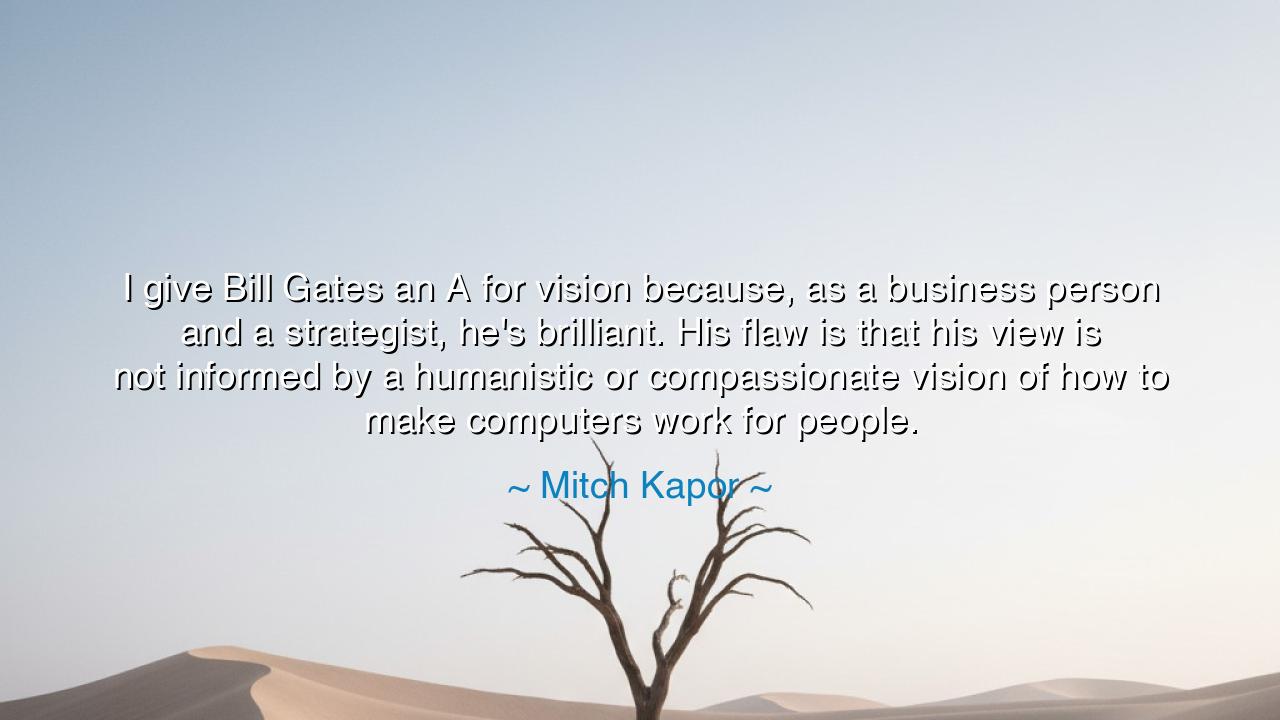
I give Bill Gates an A for vision because, as a business person
I give Bill Gates an A for vision because, as a business person and a strategist, he's brilliant. His flaw is that his view is not informed by a humanistic or compassionate vision of how to make computers work for people.






Listen, O children of the earth, for the words of Mitch Kapor echo a profound truth about vision, humanity, and the pursuit of greatness: "I give Bill Gates an A for vision because, as a business person and a strategist, he's brilliant. His flaw is that his view is not informed by a humanistic or compassionate vision of how to make computers work for people." These words carry with them a lesson that transcends the world of technology, a lesson about the importance of balance—between the brilliance of intellect and the warmth of compassion, between the genius of creation and the soul of the creator. In the pursuit of progress, we must remember that vision alone, without humanity, can lead us astray.
Bill Gates, the architect of Microsoft, is a name that has reverberated through the corridors of history. His vision of personal computing transformed the world, making computers accessible to the masses and creating an empire that would shape the future. Gates’ brilliance in business, his ability to see the path forward, and his relentless pursuit of innovation earned him his place among the greats. Yet, in his journey, he has been criticized for missing the heart of the matter—the people. Kapor’s words point to a flaw in Gates' grand design: his vision was not always informed by a humanistic perspective, a recognition that technology must not only be functional but also compassionate, serving the needs of the people it aims to help.
In the ancient texts, there are many stories of kings and emperors who ruled with great power but lacked wisdom and empathy. One such story is that of King Xerxes of Persia, who sought to expand his empire through sheer force and vision, but his conquest was marred by his inability to understand the hearts of his people. His decisions were driven by strategy and intellect, but he ignored the human cost, and his empire eventually faltered. Gates, in his pursuit of revolutionizing technology, faced a similar dilemma. His strategies, though brilliant, were often disconnected from the human experience of those who used the technology. He built systems that were highly effective, but not always humane or accessible in ways that truly served the people.
Consider the tale of Steve Jobs, who, in contrast, was a visionary who not only understood technology but also recognized its role in enriching the human experience. Jobs, though equally driven by innovation, infused his work with an understanding of the emotional connection people have with the tools they use. Apple's success was not just in the performance of its products, but in their ability to resonate emotionally with the user. The beauty, simplicity, and compassion of Apple's designs allowed people to feel that the technology was not merely a tool, but a partner in their lives—a partner that understood their needs, their wants, and their human condition. In this way, Jobs’ vision was tempered by a deep understanding of the people he sought to serve, while Gates’ vision, though transformative, often seemed to overlook the emotional and human side of technology.
The lesson here, O children of the earth, is one of balance. In our pursuits, whether in business, art, or life itself, we must recognize the importance of vision, but also the importance of humanity. The mind that sees the future must be guided by a heart that understands the present. Technology—or any creation, for that matter—cannot truly succeed if it fails to consider the human impact. Gates’ flaw, as Kapor points out, was in focusing solely on efficiency, intellect, and strategy, without grounding his work in the real needs of the people who would use his creations. To create for humanity requires a deep understanding of humanity itself, a connection to the hearts and minds of those we seek to serve.
In your own life, O seekers of wisdom, remember this: Vision without compassion can lead to great achievements, but it may also leave behind a trail of unintended consequences. Whether you are a creator, a leader, or a thinker, ask yourself: How does this serve the people? In the pursuit of your goals, be they personal or professional, do not lose sight of the human side of the equation. Let your creations—whether they be in the world of technology, art, business, or society—be informed by a deep understanding of the people you seek to serve. Strive for brilliance, but never forget the heart.
Kapor’s words serve as a timeless reminder that vision must be guided by compassion. As you walk your path, let your brilliance be tempered with understanding, your intellect guided by empathy. In this, you will create not only for the world but for the people within it—and this is the path to true greatness.






AAdministratorAdministrator
Welcome, honored guests. Please leave a comment, we will respond soon